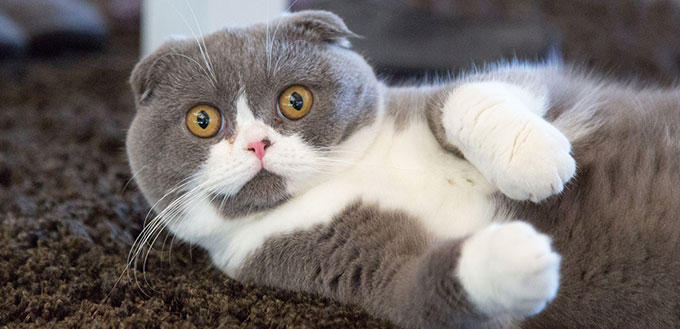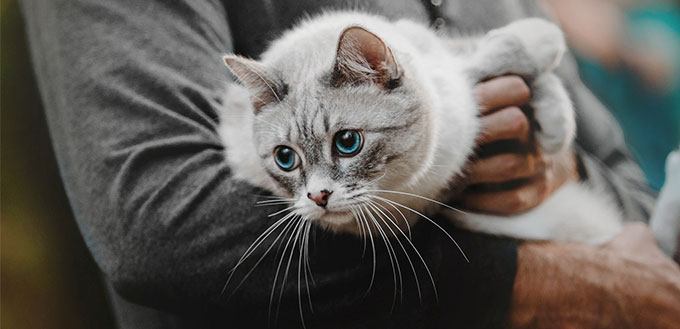A lot of who we are is defined by our memories. This is how we know what we like, what we dislike, and develop new skills. But how much do cats remember? It is clear that cats have the ability to remember as they can be trained and will learn important information like the location of their litter tray. However, what is a cat’s memory span? How similar are their memories to our memories? Do cats have a good memory? Do cats remember their owners?
Your Cat’s Short Term Memory
First, let’s make sure we understand what exactly short term memory is. Also known as a ‘working memory’, short term memory is what you use to remember small bits of information for a small period of time. For example, if your friend tells you their telephone number, you will remember it long enough to record it into your phone, but if someone asks you the next day for the phone number, you will probably have to look it up. You won’t remember that number forever.
It isn’t clear whether your cat has a short term memory or not. Studies suggest that many animals don’t have very developed short term memories, which would make sense as short term memories are closely tied to problem-solving, academic success and intelligence. Like most animals, cats have very little use for temporarily remembering phone numbers or inconsequential patterns. Put simply, if your cat could talk, they probably couldn’t tell you what happened five-minutes ago.
This is not to say that cats are not intelligent problem solvers. As any cat owner will tell you, cats can not only tackle and solve puzzles, they enjoy it. However, when compared to humans, cats will not be able to make the conscious decision to remember details in the short term, and the length of time they could retain the information will be much shorter.
Your Cat’s Long Term Memory
Long term memory, as you might imagine, is different from short term memory because it involves storing information for a much longer period of time. If we return to the example of the phone number, it is possible to remember certain phone numbers without having to look them up. Many of us will have our parents’ mobile numbers memorized, for example, or perhaps a partner or spouse. Memories usually become long term memories through familiarity and regular use. If you type in a phone-number often, you are more likely to remember it forever.
Rather than short term memories, there is plenty of evidence to suggest that cats have decent long term memories. There are many stories of cats who recognize and are reunited with owners after many years of being apart, or who exhibit fear and anxiety due to previous unpleasant experiences. Long term memories are incredibly important for all animals. They allow us to avoid danger, such as areas where we have met predators in the past, and look after ourselves, such as recognizing good hunting grounds. It is important to note, however, that these long term memories are not formed and recollected in the same way that our human memories are stored and recollected.
How Is Your Cat’s Memory Formed?
Rather than wondering ‘how long do cats remember?’, a better question is just ‘how do cats remember?’. You can’t make the assumption that cats recall their memories in the same way that we do. This is the biggest difference in our memories, bigger than the length of a cat’s memory. If we want to understand ‘do cats have a good memory?’, we need to know what type of memory we have.
Humans have episodic memories. We form and structure memories chronologically and store them in our brains independent of external cues. This allows for nostalgia, planning, fantasizing, and other complex thought processes. It particularly pertains us to the concepts of ‘long term’ and ‘short term’ memories as we strongly differentiate between ‘working memories’ that help us with our ongoing activities, and historical memories that allow us to remember our likes, dislikes, plans and skills.
Cats, however, have associative memories. This means they don’t record their life and recall it at a whim, like we do, but they recall memories in response to external events and stimuli. Knowing that you are about to come home when it reaches a certain time of day or recognizing their favorite spot in the garden are all examples of their associative memory. However, unlike us humans, they won’t think about the times you came home late or reminisce about that time they chased a robin in the garden. Ultimately, it is most likely that your cat is thinking relatively simple thoughts like:
- ‘There’s my favorite toy!’
- ‘Oh, I can smell a dangerous predator’
- ‘Its time for my human to wake up’
Does Your Cat Miss You?
Understanding memory and the emotion of ‘loss’ is incredibly complicated, and researchers are still undecided when it comes to whether our cats miss us when we are gone. Lots of studies on ‘secure attachment’ have demonstrated that most cats do not change their behavior significantly when their humans leave them. For example, one study from 2015 found that, while cats did tend to vocalize a little bit more when their owner left the room, when compared to a stranger, it was not a significant enough change to conclude a secure attachment.
Additionally, the concept of associative memory suggests that our cats do not think about us when we are not there. The way that their memory operates prevents them from ‘missing’ things in the same way that humans do. This means that it is quite likely that our cats do not miss us in the traditional sense. However, that does not mean they do not appreciate us and our presence, and it explains why many cats still react positively when they meet a human or sibling that they haven’t seen in years. They may not have thought about that human, but they sure are happy to see them!
Many studies have proven that some cats do exhibit a change in behavior when their humans are gone. Specifically, many cats demonstrate stressed or anxious behavior. Common examples include:
- Relieving themselves outside their litter box
- Destroying furniture
- Vocalizations, particularly whining or yowling
- Cowering or hiding in small spaces
It can be tempting to interpret some of these actions as revenge or anger, but the truth is it is probably anxiety caused by being left alone. Cats are naturally anxious creatures, with some breeds being more anxious than others, and this can be exacerbated by negative or scary experiences. If your cat exhibits this behavior, it is worth exploring a variety of treatments, from getting them a pet sibling or taking them to day-care to reconditioning their behavior or buying a plug-in pheromone diffuser.
The truth is that most cats will be happy to see us after we have been gone for a long time. They will recognize us as a positive influence and remember us as a happy memory. However, it is less likely that they think about us when we aren’t there as they probably don’t think specifically about us at all. Particularly anxious cats, on the other hand, could be considered to ‘miss’ us in a certain way, or rather ‘miss’ the feeling of security they get when we are with them. A cat that feels anxious when alone or with strangers, will be much better off once you are reunited with them.
Does Your Cat Hold Grudges?
Last, but certainly not least, it is important to consider the negative aspects of their associative memory. It is quite likely that cats’ being prone to anxiety as a species, as we’ve already discussed, is partially due to the way that they make and store their memories. As you might imagine, just as your cat can associate the garden with fun and happiness, they are also likely to deeply ingrain negative experiences.
This could mean your cat will hold a grudge, will grieve losses and can experience severe trauma. It can be difficult to predict what will remind a cat about a negative experience. Even if the direct cause is out of their life, other common environmental factors can trigger bad memories and emotional responses. For example, a cat that felt car sick and threw up on a traumatic car journey may react poorly to being constrained in any travel cage or dark space, regardless of whether they are going to travel by car, or a cat that was bullied by next-door’s cat might become anxious about leaving the house in general, even if you later move home.
There is a lot you can do to help a cat that is struggling with negative experiences. If your cat seems fearful, anxious, or reacts negative to specific stimuli, consult your vet or a professional cat behaviorist. They will advise you about what is best for your specific circumstances.
Sources:
- Sylvain Fiset, Duration Of Cats’ (Felis Catus) Working Memory For Disappearing Objects, Springer
- Melissa Schindler, Do Cats Have Long-Term Memory?, The Nest










